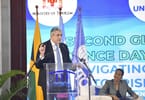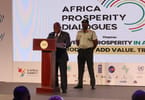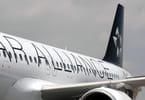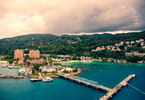Thai Airways International (THAI) highlighted the “TG 100 Strategy” to become a sustainable airline by emphasizing its leadership in domestic aviation business, as well as assuring passenger services with future collaboration with Tiger Airways in launching ThaiTiger Airways to target the ultra low-cost market.
Mr. Piyasvasti Amranand, president of Thai Airways International, delivered a keynote address at the international conference celebrating THAI’s 50th anniversary, which focused on “Core Value and Vision of THAI: Excellence in Services,” signifying the swift and steady growth of THAI over the past 50 years, with the ultimate goal of becoming a strong and sustainable airline. He also revealed the airline’s implementation of the TG100 strategic plan, which covers areas such as maintaining its leadership role in the aviation industry in Thailand and enhancing passenger confidence through improved services. THAI has come out of the world economic crisis and financial problems of 2008 successfully. Most recently, it has emerged positively in the last fiscal year, and it cannot help but to look forward to a stronger future.
Part of its Strategic Plan includes purchasing new aircraft to expand its fleet, as reflected from positive investor confidence, combined with good risk management planning and effective cost cutting. Nevertheless, there are future unknowns and its impact to THAI – such as political instability, competition with other commercial airlines, and low-cost competitors. The latter is a clear cause for THAI to cooperate with Tiger Airways in starting a new commercial airline called “ThaiTiger” to serve the customers on low-travel budget. Furthermore, THAI aims to be an environmentally-friendly airline or “Travel Green” airline in order to respond to the future trend of clean travel and tourism.
Mr. David Carbon, chief economist, DBS Group Research, Singapore, spoke at the international conference on the subject titled, “ASEAN Economy: What Next?” His address elaborated on Asian economic landscape in the short, medium, and long term, pointing out that Asia is the only region in the world to have emerged from the world economic crisis, as a result of the Lehman Brothers downfall, within a relatively short amount of time, by its own recovery devices and without assistance from the United States or other nations. Also, the economic growth rate of consumers had significantly increased compared to other regions, thereby, influencing the change in economic structure for the long term.
Dr. Suvit Maesincee, director, Sasin Institute for Global Affairs, Sasin Graduate Institute of Business Administration of Chulalongkorn University, Bangkok, shared his views on “Thriving in a new global landscape,” adding that the geo-economic change in the world was a result of the Asian economic growth, in particular with the ASEAN influence on the Thai economy. The Asian economic growth shall bring about the rise of the middle-class leading to growing demands in education, health, and tourism.
Mr. Rory Byrne, founder and owner of Powder Byrne, London, gave a fine sample on “Luxury family travel: how to attract more of it?” He underlined that currently luxury and comfort are important factors for family travel and includes three other essential factors, namely safety, reliability, and good services.
Mr. Alex Dichter, leader, Global Airline and Travel Practice, McKinsey & Company, Atlanta, spoke on “Challenges in Global Aviation Management,” stating that the aviation industry is a tough industry; however, THAI has successfully overcome obstacles, which in the past 50 years, comprised wages, reputation in services, and limited runway space. In order to restore and develop the industry, certain measures needed included the ability to overcome obstacles, control expense, and service costs – all of which THAI has managed quite well.
Mr. Andrew J. Shankland, vice president, Airbus, spoke on “Aircraft of the Future,” sharing with the audience the future trend of cabin development consisting of three factors: comfort, services, and efficiency. Comfort is the most important factor for first-class and business-class passengers, whoever they choose to fly with, while ticket prices are the factor for economy-class customers.
Mr. James R. Billing, managing director, Airline Market Analysis, Boeing Commercial Airplanes, presented “Miracle of Engineering for the Next Generation of Aircrafts.” He emphasized the intention of Boeing to become the leader in aircraft development in the 21st century with high capacity; advanced technology; and lightweight, clean, efficient, and environmental-friendly engines. Boeing is continuously delivering fine aircraft to leading airline customers like THAI. Mr. Billing was confident that the solid economic alliance between THAI and Boeing will lead to a shared and bright future.
Mr. Peter Harbison, executive chairman, Centre for Asia Pacific Aviation – spoke on “The Evolution of 21st Century Airline Models,” sharing his vision on the development of aviation business in the Asia Pacific region. He stated that the emerging strategy of airline alliances is crucial in order to avoid competition in overlapped areas and to prevent competition in acquiring passengers.
WHAT TO TAKE AWAY FROM THIS ARTICLE:
- ” His address elaborated on Asian economic landscape in the short, medium, and long term, pointing out that Asia is the only region in the world to have emerged from the world economic crisis, as a result of the Lehman Brothers downfall, within a relatively short amount of time, by its own recovery devices and without assistance from the United States or other nations.
- Suvit Maesincee, director, Sasin Institute for Global Affairs, Sasin Graduate Institute of Business Administration of Chulalongkorn University, Bangkok, shared his views on “Thriving in a new global landscape,” adding that the geo-economic change in the world was a result of the Asian economic growth, in particular with the ASEAN influence on the Thai economy.
- Excellence in Services,” signifying the swift and steady growth of THAI over the past 50 years, with the ultimate goal of becoming a strong and sustainable airline.






















